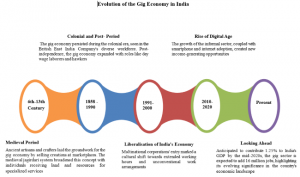
The gig economy in India is not merely a reflection of its counterparts in developed nations. Historically present, it has been significantly transformed by digital technology. Recognising this unique aspect is crucial for developing welfare policies specifically suited to Indian gig workers, rather than adopting a generalised approach from abroad.
The year 2023 marked notable changes in the global gig economy, particularly in worker welfare. This focus is vital given the inherent uncertainties of this unprotected economic segment. A significant development was the European Union’s potential reclassification of certain gig workers as employees, enhancing worker protection. In India, the Rajasthan Platform-Based Gig Workers (Registration and Welfare) Act, 2023, exemplifies commitment to gig worker welfare, inspiring similar legislation in states like Karnataka. However, India must carefully consider its unique socio-economic landscape before adopting international models.
READ | The health impact of microplastics: A deepening concern
While these global developments are encouraging, India needs to be cautious. In the Global North, the gig economy emerged alongside robust social security systems, strong infrastructure, and established worker protections. India does not have the social security nets which makes direct adoption of foreign models potentially harmful. A tailored approach, recognising the vulnerabilities and realities of Indian gig workers, is essential.
Evolution of gig economy in India

In the Global North, the gig economy represents a transition from traditional labour to flexible, digital employment, as highlighted in the World Bank’s recent report. Since 2011, this shift has been characterised by online platforms connecting service providers with immediate demand. Narratives from the Global North emphasise the flexibility and empowerment of employment roles, supported by robust social security systems and strict regulations – which are missing in the Indian context.
The trajectory of India’s gig sector, however, is unique. The NITI Aayog report indicates that the Indian gig workforce, around 7.7 million in 2020-21, is expected to rise to 23.5 million by 2029-2030. Unlike the Global North, where gig work often supplements income, in India, it often offers the primary livelihood. This is due to its historical roots in sectors like agriculture and daily wage labour. The digital transformation in India has focused on leveraging technology for efficient on-demand service delivery, supported by widespread internet and mobile phone usage.
This difference necessitates different policy solutions. Unlike the Global North, where gig work may supplement existing income streams, in India, it can be the sole source of livelihood, particularly for those transitioning from informal sectors. This context underscores the urgency of addressing issues like low wages, lack of social security, and limited job security, which threaten to perpetuate existing inequalities within the informal economy. Policies focused on enhancing job quality, providing social security benefits, and facilitating upskilling will empower Indian gig workers to thrive in the digital formal markets.
The Indian gig model differs notably from the Global North. In India, gig work often blurs with full-time employment, and many rely on it as their main income source. This dependency, rooted in informal sectors such as agriculture and daily wage labour, presents challenges. Gig workers, typically classified as contractors, lack social security benefits, and digital platform companies often resist providing these due to cost and competitiveness concerns. Consequently, Indian gig workers face low pay and social standing issues, perpetuating inequalities within the informal economy.
Indian policies on gig workers need a comprehensive overhaul, focusing on job quality and upskilling initiatives, vital for a resilient workforce in the digital formal markets. Policies should ensure fair pay and continuous skill development for workers transitioning from informal to digital formal sectors.
Recognising the unique nature of India’s gig workers is essential amid global shifts. In India, gig roles, deeply embedded in an unequal power divide, are not exceptions, but the norm. Technology alone cannot resolve these socio-economic disparities. A nuanced understanding of the social realities shaping gig practices is crucial. State-led social security measures, strict regulation of platform companies, and clear guidelines for worker classification, social security benefits, fair wages, and continuous upskilling are essential. These elements form the foundation of a robust, equitable gig economy in India, reflecting its unique dynamics and challenges.
(The authors work for CUTS International, a global public policy research and advocacy group.)
Pradeep S Mehta is the Secretary General of CUTS International, a leading policy research and advocacy group. He is a featured columnist with several leading publications in the country.


